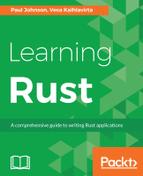Writing to a file is a two-step process: opening the file (possibly creating it if it didn't exist before) and then the writing of the file. This is very similar to how writing to a file in the C family of languages is carried out.
You can create a file for writing in a single call to std::fs::File::create. The open method in the same namespace opens a file for reading. If you need more fine-tuned permissions, std::fs::OpenOptions::new creates an object through which you can tweak the parameters and then open the file.
As with any file operation, anything could fail, so the result should always be checked:
let file: Result<File,Error> = options.open(path);
As mentioned before, Rust uses a generic type, Result<T,U> , quite frequently as an error-trapping mechanism. It encapsulates two values: the left-hand side value is used when the operation succeeds, and the right-hand side value is used when it does not succeed.
Once we have completed the file creation, we can move on to writing to the file.
First, we check the results of the Result comparison. If an error hasn't been thrown there was no error, and we can then create a BufWriter:
let mut writer = BufWriter::new(&file); writer.write_all(b"hello text file ");
We don't need to flush the buffer, as write_all will do that for us (it calls flush() once completed). If you don't use write_all, then you need to call flush() to ensure the buffer is cleared.
